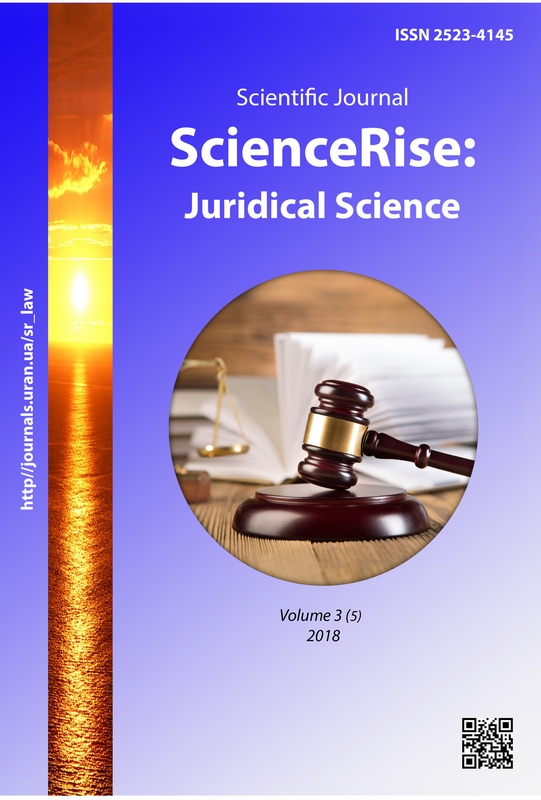The subject of legal culture: conceptual principles of research
DOI:
https://doi.org/10.15587/2523-4153.2018.143337Keywords:
people, law, culture, legal culture, legal subject, subject of legal cultureAbstract
The scientific article is devoted to the analysis of the conceptual foundations of understanding the concept of the subject legal culture. It was established, that if culture combines the material and the ideal, acting as the subject (such that learns how the public person acts), and as an object (created by the external world), the whole field of culture «revolves» around the subject, which fills the world culture, develops and changes it at the same time developing personally. Therefore, a person appears the main value of culture. With the growth of the scale of human freedom, the world of culture also develops increasingly. Reasonably, that if we proceed from this understanding of the subject and culture in general, legal culture, as one of the components of general culture, is also understood as the subject – entity, that fills its own activities, developing and changing the world and changing right along with it.
It is proved that the legal culture of a particular person dialectically combines the general, special and single. It is one of the specific forms of the general culture of society, reflecting the social moral and legal ideas, political-legal ideals and principles. Special in the legal culture is caused by the person belonging to a certain social community, professional groups, and the like. The unit expresses a particular aspect of the legal culture of a person, dictated by individual characteristics, ideology, preferences, emotions. Legal culture is always implemented using a specific personality depending on it and at the same time affecting it, forming the real subject of legal culture. Proposed in the definition of the subject of legal culture include the following aspects: general (legal culture of the society), special (legal sub-culture) and individual (legal culture of the individual personality)
References
- Huberskyi, L., Andrushchenko, V., Mykhalchenko, M. (2002). Kultura. Ideolohiia. Osobystist: Metodoloho-svitohliadnyi analiz. Kyiv: Znannia Ukrainy, 580.
- Arkhipov, S. I. (2005). Sub"ekt prava (teoreticheskoe issledovanie). Ekaterinburg, 46.
- Lytvynov, O. M. (2014). Pravo yak fenomen kultury: sproba filosofskoho osmyslennia. Luhansk: Yantar, 800.
- Matvieieva, L. H. (2015). Tranzytyvnist u pravovii sferi. Kyiv: Yurinkom Inter, 328.
- Rabinovych, P. M., Bachynskyi, T. V. (2015). Formuvannia osnov pravovoho svitohliadu, pravovoi svidomosti ta pravovoi kultury shkilnoi molodi (teoretyko- y sotsioloho-pravove doslidzhennia). Pratsi Lvivskoi laboratorii prav liudyny i hromadianyna Naukovo-doslidnoho instytutu derzhavnoho budivnytstva ta mistsevoho samovriaduvannia NAPrN Ukrainy. Seriia 1. Doslidzhennia ta referaty. Lviv: Vyd-vo LOBF «Medytsyna i pravo», 29, 224.
- Hetman, A. P., Herasina, L. M., Danylian, O. H. et. al; Tatsii, V. Ya., Hetman, A. P., Danylian, O. H. (Eds.) (2013). Pravove vykhovannia v suchasnii Ukraini. Kharkiv: Pravo, 440.
- Karmin, A. S., Bernatskiy, G. G. (2006). Filosofiya. Saint Petersburg: Piter, 560.
- Korshunov, A. M., Mantatov, V. V. (1988). Dialektika sotsial'nogo poznaniya. Moscow: Politizdat, 383.
- Iakoviuk, I. V.; Tsvik, M. V., Petryshyn, O. V. (Eds.) (2008). Pravova kultura yak kharakterystyka yakisnoho stanu pravovoi systemy. Pravova systema Ukrainy: istoriia, stan ta perspektyvy. Vol. 1. Metodolohichni ta istoryko-teoretychni problemy formuvannia i rozvytku pravovoi systemy Ukrainy. Kharkiv: Pravo, 640–663.
- Gobozov, I. A. (1999). Vvedenie v filosofiyu istorii. Moscow: TEIS, 363.
- Zhigulin, A. (2013). Ponyatie pravovoy kul'tury i ee sushhnostnye kharakteristiki. Nauchno-issledovatel'skie publikatsii, 2, 44–74.
- Shefrukov, A. Z. (2008). Dinamika pravovoy kul'tury. Novye tekhnologii, 5, 153–155.
- Mitskevich, A. V. (1962). Sub"ekty sovetskogo prava. Moscow: Gos. izd-vo yurid. lit-ry, 212.
- Rabinovych, P. M. (2008). Osnovy zahalnoi teorii prava ta derzhavy. Lviv: Krai, 224.
- Zaiets, A. P.; Shemshuchenko, Yu. S. et. al. (Ed.) (2003). Subiekt prava. Yurydychna entsyklopediia. Vol. 5: P-S. Kyiv: Ukr. entsykl., 680.
- Lvova, O. L.; Shemshuchenko, Yu. S. (Ed.) (2012). Subiekt prava. Velykyi entsyklopedychnyi yurydychnyi slovnyk. Kyiv: Vyd-vo «Iurydychna dumka», 884.
- Arkhipov, S. I. (2004). Sub"ekt prava: teoreticheskoe issledovanie. Saint Petersburg: Izdatel'stvo R. Aslanova «YUridicheskiy tsentr Press», 469.
- Grevtsov, Yu. I. (2014). Sub"ekt prava. Vestnik SPbgU. Ser. 14, 1, 33–39.
- Kant, I. (1965). Kritika chistogo razuma. Sochineniya. Vol. 4. Part 1. Moscow: Mysl', 554.
- Selivanov, V. (2000). Paradoksy svobody i demokratii. Viche, 12, 68–80.
- Trubetskoy, E. N.; Bernadskiy, G. G. (Ed.) (1998). Entsiklopediya prava. Saint Petersburg: Lan', 224.
- Ferguson, A. (1792). Principles of Moral and Political Science. Edinburgh, 2.
- Il'in, I. A. (2003). Teoriya gosudarstva i prava. Moscow: YUrist", 591.
- Il'in, I. A. (1993). Put' k ochevidnosti. Moscow: Respublika, 432.
- Bobrovnyk, S. V.; Zaichuk, O. V., Onishchenko, N. M. (Eds.) (2006). Yurydychna vidpovidalnist. Teoriia derzhavy i prava. Akademichnyi kurs. Kyiv: Yurinkom Inter, 497–525.
- Marchuk, V. M., Nikolaieva, L. V. (2004). Narysy z teorii prava. Kyiv: Istyna, 304.
Downloads
Published
How to Cite
Issue
Section
License
Copyright (c) 2018 Larysa Makarenko

This work is licensed under a Creative Commons Attribution 4.0 International License.
Our journal abides by the Creative Commons CC BY copyright rights and permissions for open access journals.
Authors, who are published in this journal, agree to the following conditions:
1. The authors reserve the right to authorship of the work and pass the first publication right of this work to the journal under the terms of a Creative Commons CC BY, which allows others to freely distribute the published research with the obligatory reference to the authors of the original work and the first publication of the work in this journal.
2. The authors have the right to conclude separate supplement agreements that relate to non-exclusive work distribution in the form in which it has been published by the journal (for example, to upload the work to the online storage of the journal or publish it as part of a monograph), provided that the reference to the first publication of the work in this journal is included.









